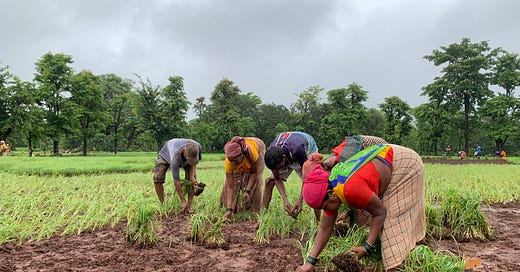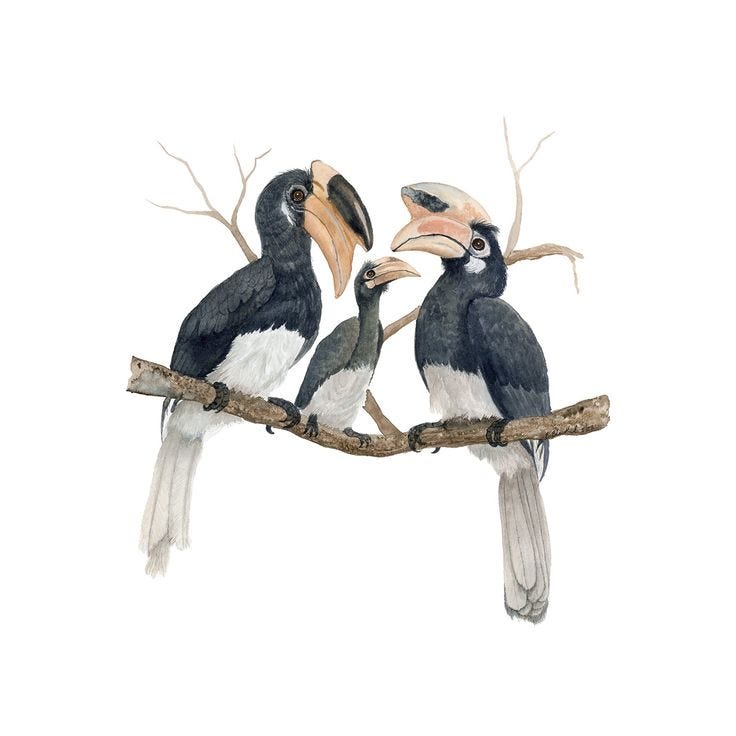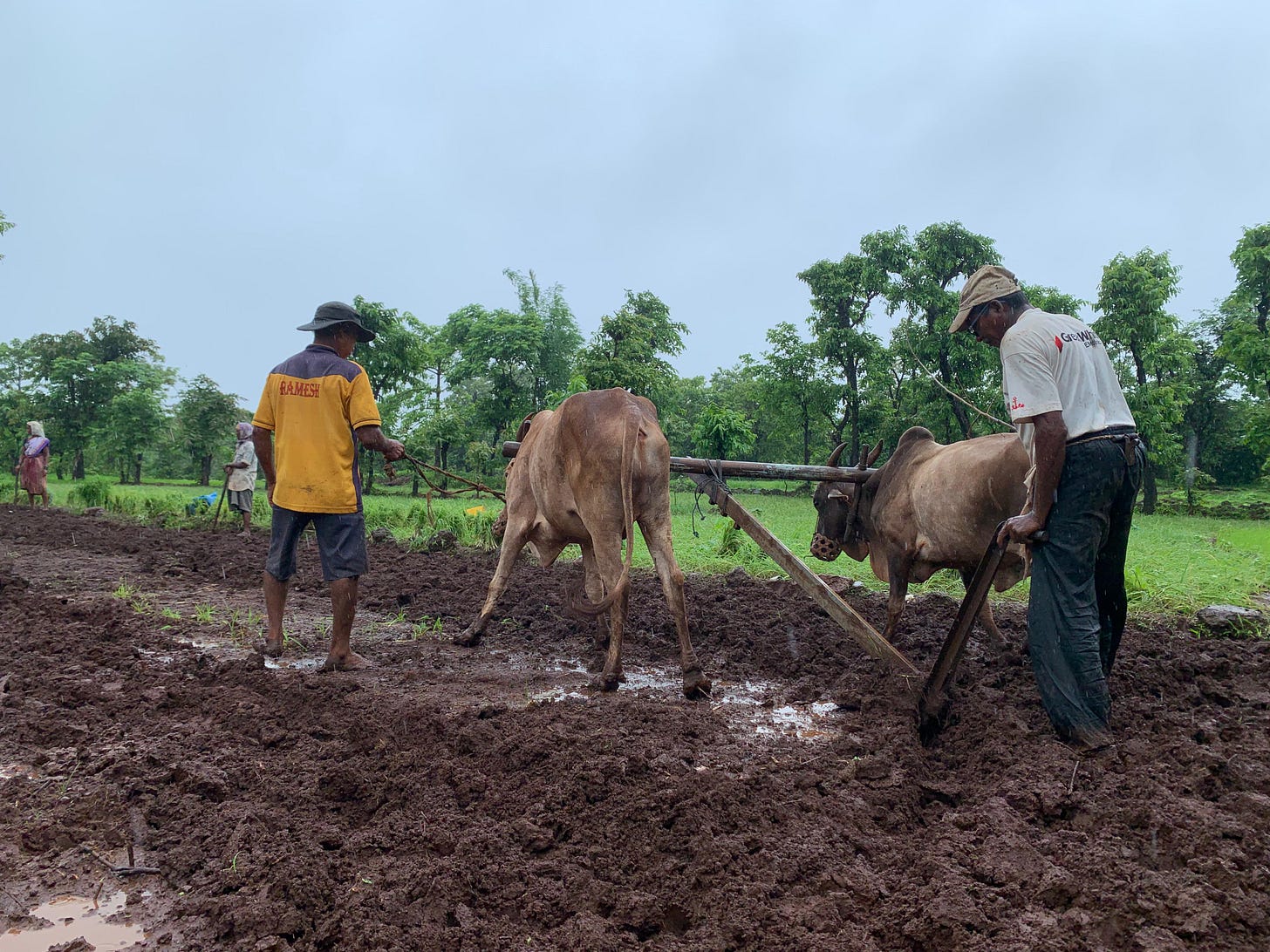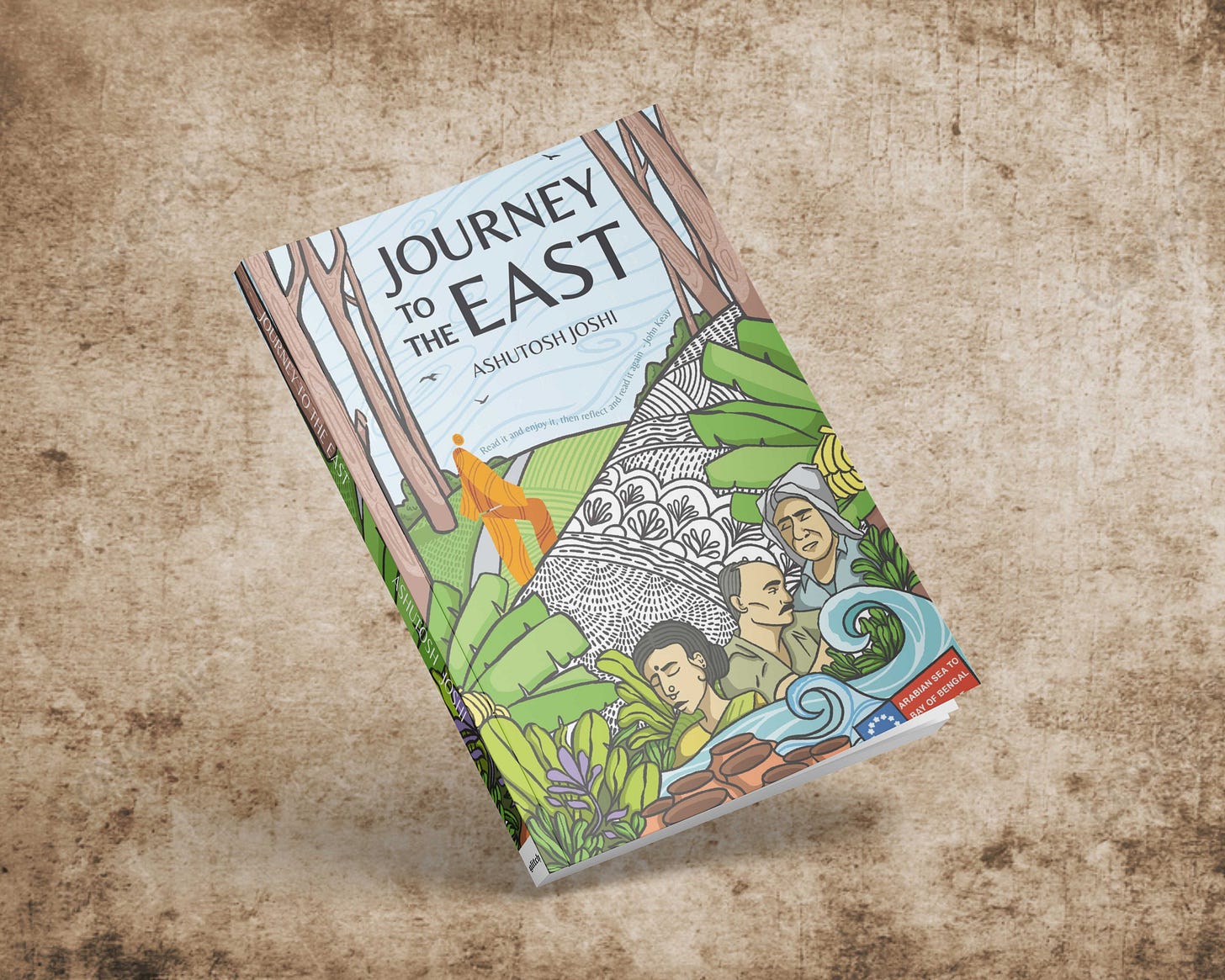Sanju dada came in tip-toeing, like he always does. Only after a moment of standing still, he proclaimed, ‘It will rain today.’ I went out to take a look at the sky. There wasn’t even a slightest hint of dark clouds, burdened by the excess weight of water. To be honest, it was a clear day; almost felt like we had got a cheat day to get our clothes out to dry in an otherwise humid climate. Yet, I knew that he would be right. He always is. The elders say that animals and birds know about the changing of weather.
This bird is called ‘kakner’ in our language (Malabar Pied Hornbill). They say that it starts screaming long before the rains arrive. Villagers start off their monsoon farming only after they have received a green signal from this bird. Flies tend to become sluggish and crawl on exposed body parts prior to hot, humid, wet weather coming in. If you look closely you will realise that these signs are all around us. Nature knows what is coming. Just like that kakner is a part of nature, we are too. We have a system in our body that predicts oncoming things. Maybe its not the dark clouds up in the sky, but a slight change in temperature - a bit of humidity, a bit of cold breeze. In that sense, before we confined ourselves to our new environments, inside these cubicles, managing our weather, we too were like those animals and birds. We knew our surrounding a lot better, because our survival depended on that. We can still find that connection and Sanju dada definitely is. He is more connected to nature than anyone else that I have met in my village. Many a times I wonder when I look at him. He has such incredible knowledge about the world around him and yet by all modern standards he is uneducated, primitive in a sense.
I know, I wrote an entire paragraph to make a certain point and you all know that you had this coming. Did it rain then? Ofcourse! It did. I am not here to write a fictional story where nothing happens at the end of the story.
Within only a few hours, winds were moving at a breath-taking speed. Over-grown trees, who otherwise liked to keep a safe distance from the other trees, were using this to chance upon their neighbouring trees; kissing them and touching them without their consent. “It’s almost here”, Sanju dada passed his verdict. We could hear the rain roaring in the distance. It took almost a couple of minutes for the rains to reach our house. One, two, a dozen, a thousand drops on the overhead metal sounded like a concert which was just about to start. The final few birds were making their safe passage to their nests. Sharda kaku was running around in haste to pick up the fruits that she had kept out to dry. Only if she wouldn’t have ridiculed Sanju dada, then she would have been better prepared for a downpour like this one. We were laughing at her from a distance. No, we didn’t go to help her out. We are the kind of people who would like to mock someone for not listening - in friendly way ofcourse.
Granny shouted from the kitchen, “Sanjaaaaa… tea is ready. Don’t make me wait for long.”
This incident made me think. A LOT. How come we became so disconnected from the natural world? Forget what all we know. What all do we not know about ourselves? About our connection to nature? Things are always changing. Our body knows this, but we have successfully managed to supress these feelings within our bodies.
Nature is right here, like you are right here, like the blue sky is right here, behind the grey clouds. If we give ourselves a chance to stay still long enough, the clouds may pass for a bit, and for those fleeting initial moments, we may get a glimpse of the blue sky, that is our own nature. And when we have had a glimpse of that, we may never look at nature as something different from us.
Gaurav, my cousin who studies molecular biology in Mainz, Germany, is back for a month. In two months time, he will be the head of a department, in the University Medical Centre in Mainz. Don’t ask me what department… I always tend to forget. All I know, is that it has something to do with checking blood samples and other organs to see if they are fit for transplants. I KNOW.. much smarter than me, and I am super proud of him. If you happen to be in Germany and happen to visit Mainz, do visit him at the University Medical Centre, just for the sake of it and tell him that you have read about him on a Substack article. I want to see how confused he would be by that statement.
I instantly sacked all my plans to spend some time with him, because I know that we would not be meeting for another year, at least.
Granny had made some sweets amongst other random items that he likes. Someone has said, and if its not someone, then its me, I am saying this, ‘Distance creates stronger bonds.’ (Prove me wrong by commenting who actually said this. I am ready.) We were like any other cousins; fought a lot growing up, always competed with each other, but I guess maturity is understanding that people have their own ways of life and accepting them as they are. We both have accepted each other.
Granny had made it clear that playing cards is a ritual, in which all eligible members should join. No ifs and buts. “Maarka Daav”, this card game has come down through generations and all members of the family MUST know how to play this game. Its more like we need enough members to play this game. We started off and the game went on for at least two hours. Granny is the best cheat in this game. She changes the cards, mixes up the score, distracts you from playing the right card and she proudly says that she has got this from her mother, my great grandmother.
We don’t usually check time and we look at the clock only when one of the teams is losing, that too for a loooooong time. That’s the time when they are frustrated - they just want to leave the game, stop the embarrassment and nagging that the winning team does. In a way it’s ragging, but this game somehow makes the losing person mentally stronger.
The rains had stopped in the meanwhile. All the villagers were heading off to their farms and it was clear that we had to get out too. Sitting cross-legged had made our legs lazy. Sanju dada had already left for his farm. It was afternoon when we decided to head off. As we entered the narrow gate made out of plants, which acts as a entry to the larger open field on the top of the hill, we saw many villagers walking towards their farms. Some were already working on the fields. Waving at us. Reminding my cousin that he is a foreigner now. “Germans have come”, they said. This friendly mocking is the backbone of the village life - without this, we would be no different than the urban people. This friendly mocking is enough to bring you down from your high horse. To make you feel grounded.
Times have changed and farming techniques have changed but its good to see people keeping up with traditions. I saw a bunch of people tilling the field with two oxen. It was refreshing to watch a man play and guide the oxen to work intently. We too joined them in the fields.
Its no wonder that this place, konkan, has inspired many a poets to write such wonderful lines.. I know that it is impossible to translate the emotions that this poem brings forth in marathi, but here it is..
The Rain
The rain gives the call and the earth responds with a shiver;
the two, the earth and sky drench in a love fever.
Thick black clouds roar and rumble. Blue peacocks muse and mumble;
With thousand eyes in the tail. They stare at the ethereal river.
The green mingles in the blue. So the egrets deck the blue (sky).
An ecstasy reigns on the earth, as water streams below.
Over drenched forests. Clouds sing songs;
silent sentiments of the heart find a wordy wing.
Rapt and quiet, the earth, softly smiles in the green.
The streams fleetingly fling, a flying kiss in the sheen.
Heaven and earth meet, showering love on each other
Union of Blue and Green,
the world watches in wonder.
-Shanta Shelke
Only a few days in the city and we feel exhausted. We get anxious, stressed out, not because we are overworked, but because we are overconsumed. We look at others lost in their phones, people cut conversations mid-way to make way for that next reel to get some space in their head. There is no friendly mocking around done by random strangers. Everyone is consumed in an addiction that is hard to let go of. But somehow, when we come back to the countryside we feel better. We feel like we matter. For some reason there is a sense of belonging, not with your house or your property, but the vast and abundant nature - calling you in, asking you to join the dance.
I will be spending a few more days with my cousin, so expect some random wanderings in the village.
“Journey to the East”- is currently available as a paperback through my website and on Amazon Kindle globally.
If you would like to help me out in other ways, you can buy me a coffee via paypal, www.paypal.me/ashutoshjoshistudio. You would think that a couple of dollars/pounds won’t mean much, but it does, especially in India where it is difficult to make ends meet as an artist.
You can buy my first book “Journey to the East”, a memoir about an 1800 km walk through India, through my website .
If you would like to buy prints of my photographs, you can choose the photographs you like on my website and send me an email. I will send you custom quotes for the sizes you’d like.









